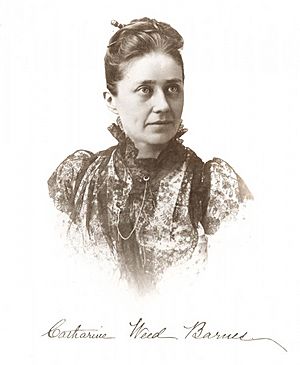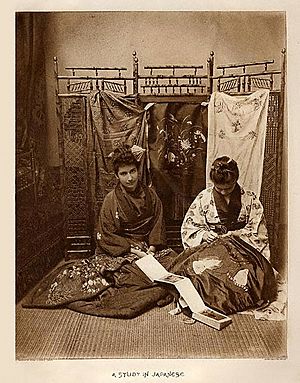Catharine Weed Barnes facts for kids
Quick facts for kids
Catharine Weed Barnes
|
|
|---|---|

Photographed by Edward S. Sterry (1890)
|
|
| Born |
Catharine Weed Barnes
January 10, 1851 Albany, New York, United States
|
| Died | July 31, 1913 (aged 62) Hadlow, England
|
| Nationality | American |
| Known for | photographer |
Catharine Weed Barnes (born January 10, 1851, died July 31, 1913) was an important American photographer. She was a pioneer who moved to England later in her life. Catharine strongly believed in supporting other women photographers.
Contents
Early Life and Photography Journey
Catharine Weed Barnes was born in Albany, New York. She was the oldest child in a wealthy family. Her father was William Barnes Sr. Her mother was Emily P. Barnes. Emily's father, Thurlow Weed, was a well-known politician. Catharine's brother, William Barnes Jr., became a newspaper owner. He also led the Republican Party in New York.
Catharine went to Vassar College. However, she had to leave early to help her family. In 1872, she traveled to Russia with her father. He was attending an important international meeting.
Becoming a Photographer
Catharine started taking photos in 1886. By 1890, she became an editor for American Amateur Photographer magazine. She wrote a special section called "Women's Work." She also wrote for Frank Leslie's Weekly.
Catharine joined several photography groups. These groups were usually only for men. She became a member of the National Photographers' Association of America. She also joined the Camera Club of New York. Her photos and magic lantern slides won many awards.
Moving to England
In 1892, Catharine traveled to Britain. She gave a speech at a photography meeting in Edinburgh. While in London, she met Henry Snowden Ward. He edited photography magazines. Soon after, they got married.
Catharine then moved to England. She worked with her husband on several magazines. These included The Photogram and Photograms of the Year. She also helped illustrate some of her husband's books. Her photos appeared in books like Shakespeare's Town and Times (1896).
Throughout her life, Catharine spoke up for women in photography. She believed their work should be judged fairly. She wanted their photos to be seen as equally good as men's.
Catharine Weed Barnes passed away in Hadlow, England.
Her Lasting Impact
Catharine Weed Barnes took about 10,000 photos. She used glass plates for her negatives. Sadly, only about 2,000 of her photos are still around today.
Her work is kept in special collections. The George Eastman Museum in Rochester, New York, has some of her photos. The Kent Archaeological Society in Maidstone, England, also has many. This collection includes photos she took for her husband's books.
Catharine Weed Barnes is remembered as a talented photographer. She also helped open doors for other women in the field.
 | Sharif Bey |
 | Hale Woodruff |
 | Richmond Barthé |
 | Purvis Young |


